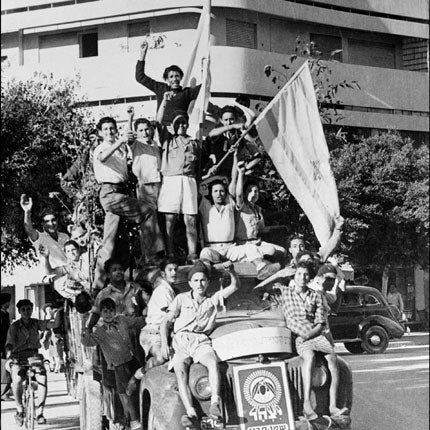The Arabs and the Holocaust: The Arab-Israeli War of Narratives, By Gilbert Achcar
Message of hope from the Holy Land

Your support helps us to tell the story
From reproductive rights to climate change to Big Tech, The Independent is on the ground when the story is developing. Whether it's investigating the financials of Elon Musk's pro-Trump PAC or producing our latest documentary, 'The A Word', which shines a light on the American women fighting for reproductive rights, we know how important it is to parse out the facts from the messaging.
At such a critical moment in US history, we need reporters on the ground. Your donation allows us to keep sending journalists to speak to both sides of the story.
The Independent is trusted by Americans across the entire political spectrum. And unlike many other quality news outlets, we choose not to lock Americans out of our reporting and analysis with paywalls. We believe quality journalism should be available to everyone, paid for by those who can afford it.
Your support makes all the difference.The subtitle to Gilbert Achcar's excellent study points to his care for the particularities of language as well as of history.
The precise meanings of words matter when people are dying over the precise nature of borders and territories and histories.
It might seem self-evident to declare that Israel "plainly owes its creation to the Holocaust", as that land was by no means the goal of most European Jews before the Second World War, but this discomforting message for Zionists has been turned into an end which justifies the means, Achcar argues. His account of the Arab response to the Jews' plight shows up divergent opinions, and the shifting nature of what constitutes the "enemy". For Egypt's President Nasser, the enemy was Britain; for Marxist Arabs, it was fascism, soon represented in their eyes by Zionism. This criss-crossing of enemy types has been solidified since Israel's military action in the 1990s; the "Nakba", the tragedy of the Palestinian expulsion has only, Achcar argues, united disparate voices under a single nationalist banner.
The concern of liberal thinkers such as Achcar (whose "faith in human reason" concludes the book with a message of hope for the future) is what we can learn from the mistakes made by governments before, during and after the Holocaust. Not everyone will agree with his thesis, but his attention to linguistic and historical detail is indubitable.
Join our commenting forum
Join thought-provoking conversations, follow other Independent readers and see their replies
Comments